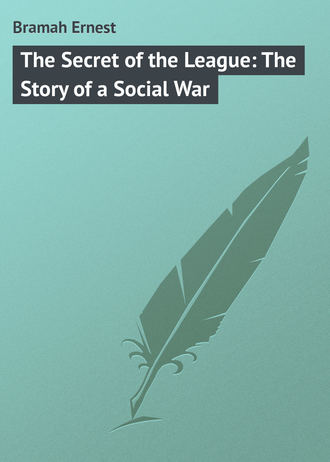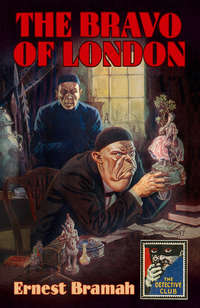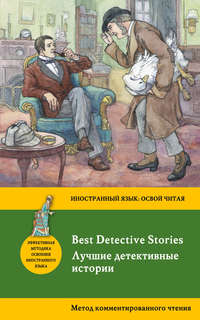 полная версия
полная версияThe Secret of the League: The Story of a Social War
"Beer and sandwidges!" muttered Comrade Tintwistle, with no affectation of delight, to a chosen spirit. "And this is the man we pay fifty quid a week to!"
"Ah!" assented the friend, following Mr Tubes's hospitable directions by strolling round the room and fingering the ornaments. "Well, when it comes to a general share-out I don't know but what I should mind having this here little round barometer for my parlour."
"Neat little thing," assented Tintwistle with friendly interest. "What does it say?"
"Seems to be dropping from 'Change' to 'Stormy,'" read the friend.
CHAPTER VI
MISS LISLE TELLS A LONG POINTLESS STORY
Sir John Hampden lived within a stone-throw of the Marble Arch; George Salt had established himself in Westminster; and about midway between the two, in the neighbourhood of Pall Mall, a convenient but quite unostentatious suite of offices had been taken and registered as the headquarters of the Unity League.
The Unity League was a modern organisation that had come into existence suddenly, and with no great parade, within a week of that day when George Salt had forced Hampden to hear what he wished to say, a day now nearly two years ago. The name was simple and commonplace, and therefore it aroused neither curiosity nor suspicion; it was explained by the fact that it had only one object: "By constitutional means to obtain an adequate representation of the middle and upper classes in Parliament," a phrase rendered by the lighter-hearted members colloquially as "To kick out the Socialists." The Government, quite content to govern constitutionally (in the wider sense) and to be attacked constitutionally (in the narrower sense), treated the existence of the Unity League as a playful ebullition on the part of the milch sections of society, and raised the minimum income-tax to four and threepence as a sedative.
At first the existence of the League met with very little response and no enthusiasm among those for whom it was intended. It had become an article of faith with the oppressed classes that no propagandism could ever restore an equitable balance of taxation. Every change must inevitably tend to be worse than the state before. To ask the working classes (the phrase lingered; by the demarcation of taxation it meant just what it conventionally means to-day, and, similarly, it excluded clerical workers of all grades) – to ask this privileged class which dominated practically every constituency to throw out their own people and put in a party whose avowed policy would be to repeal the Employers' Liability Act (Extended), the Strikes Act, the Unemployed Act, the Amended Companies Act, the Ecclesiastical Property Act, the infamous Necessity Act, and a score of other preposterous Acts of Injustice before they even gave their attention to anything else, had long been recognised to be grotesque. A League, therefore, which spoke of working towards freedom on constitutional lines fell flat. The newspapers noticed it in their various individual fashions, and all but the Government organs extended to it a welcome of cold despair. The general reader gathered the impression that he might look for its early demise.
The first revulsion of opinion came when it was understood that Sir John Hampden had returned to public life as the President of the League. What his name meant to his contemporaries, how much the League gained from his association, may be scarcely realised in an age existing under different and more conflicting conditions. Briefly, his personality lifted the effort into the plane – not of a national movement, for with the nation so sharply riven by two irreconcilable interests that was impossible, but certainly beyond all cavil as to motives and methods. When it was further known that he was not lending his name half-heartedly as to a forlorn hope, or returning reluctantly as from a tardy sense of duty, men began to wonder what might lie behind.
The first public meeting of the newly formed League deepened the impression. Men and women of the middle and upper classes were invited to become members. The annual subscription being a guinea, none but adults were expected. Those of the working class were not invited. If the subscription seemed large, the audience was asked to remember what lay at stake, and to compare with it the case of the artisan cheerfully contributing his sixpence a week to the strike fund of his class. "As a result there is a Strikes Act now in force," the President reminded them, "and the artisan no longer pays the cost – "
"No, we do," interjected a listener.
"I ask you to pay it for three years longer; no more, perhaps less," replied Hampden with a reassuring smile, and his audience stared.
If the subscription seemed large for an organisation of the kind the audience was assured that it was by no means all, or even the most, that would be expected of them. They must be prepared to make some sacrifice when called upon; the nature he could not indicate at that early stage. No balance sheet would be published; no detailed reports would be issued. There would be no dances, no garden-parties, no club houses, no pretty badges. The President warned them that membership offered no facilities for gaining a precarious footing in desirable society, through the medium of tea on the Vicarage lawn, or croquet in the Home Park. "We are not playing at tin politics nowadays," he caustically remarked.
That closed the exordium. In a different vein Hampden turned to review the past, and with the chartered freedom of the man who had prophesied it all, he traced in broad lines and with masterly force the course of Conservative ineptitude, Radical pusillanimity, Labour selfishness, and Socialistic tyranny. What would be the crowning phase of grab government? History foreshadowed it; common-sense certified it. Before the dark curtain of that last stupendous act the wealth and wisdom, the dignity and responsibility of the nation, stood in paralysed expectancy.
There was a telling pause; a dramatic poignant silence hung over the massed crowd that listened to the one man who could still inspire a kindling spark of hope. Then, just at the opportune moment, a friendly challenge gave the effective lead:
"And what does Sir John Hampden offer now?"
"Absolute victory," replied the speaker, with the thrilling energy of quiet but assured conviction, "and with it the ending of this nightmare dream of life in which we are living now, when every man in his half-guilty helplessness shuns his own thoughts, and all are filled with a new unnatural pain: the shame of being Englishmen. Blink the fact or not, it is civil war upon which we are now engaged. Votes are the weapons, and England and her destiny, nothing more or less, are the stakes. It has frequently been one of the curious features even of the most desperate civil struggles of the past, that while battles were raging all around, towns besieged, and thrones falling, commerce was at the same time being carried on as usual, wordy controversies on trivial alien subjects were being hotly discussed by opposing sections, as though their pedantic differences were the most serious matters in the world, and the ordinary details of everyday life were proceeding as before. So it is to-day, but civil, social, war is in our midst, and – again blink it or not – we are losing, and wage it as it is being waged we shall continue to lose. I am not here to-day to urge the justice of our cause, to palliate unwise things done, to indulge in regrets for wise things left undone. One does not discuss diplomacy in the middle of a battle. I am here to hold out a new hope for the triumph of our cause, for the revival of an era of justice, for the recovered respect of nations. I have never been accused of undue optimism, yet fully weighing my words, I stand on this platform to-night to share with you my conviction that it is within our power, in three years' time, to send an overwhelming majority of our reconstructed party into power, to reduce the income-tax to a sane and normal level, and to recommence the building up of a treasonably neglected navy."
Another man – perhaps any other man – would have been met by ridicule, but Hampden's reputation was unique. The one point of emphasis that could not fail to impress itself upon every listener was that there was something behind all this. It was a point that did not convey itself half so forcefully in the newspaper reports, so that, as Socialists and their friends did not attend the meetings (even as members of the wealthier classes had ignored Socialistic "vapourings" in days gone by), any menace to the Government that the League might contain was lost on them for the present. It was the moral of an old fable: the Dog in Luxury grown slothful and unready.
The subscription deterred few. It was an epoch when everything was, apparently, being given away for nothing; though never had the grandfatherly maxim that in business nothing ever is offered without its price, been so keenly observed. But superficially, to ride in a penny 'bus entitled one to a probable pension for life; to buy a pound of tea was only the preliminary to being presented with a motor-car or a grand piano. Fortunes lurked in cigarette boxes, whole libraries sprang gratuitously from the columns of the daily papers; not only oxen, but silver spoons inexhaustible were compressed within the covers of each jar of meat extract, and buried treasure, "Mysterious Millionaires," and "Have-you-that-ten-pound-note?" men littered the countryside. To be asked to subscribe a guinea for nothing definite in return, was therefore a pleasing novelty which took amazingly. So, too, the idea of participating in some sort of legal revolution which would entail sacrifices and result in unexpected developments, was found to be delightfully invigorating. How the movement spread is a matter of history. Incomes had been reduced wholesale, yet, so great was the confidence in Hampden's name, that many members sent their subscription ten times told. When he asked, as he frequently did at the close of a meeting, for recruits who were willing to devote their whole time unpaid to the work in various departments, more than could be accepted were invariably forthcoming. All members proselytised on their own initiative, but within these there were thousands of quiet and devoted workers who were in close touch with the office of the League. They acted on detailed instructions in their methods, and submitted regular reports of progress and of the state of public feeling in every part of the kingdom and among every class of the community. To what length the roll of membership had now extended only two men knew, even approximately. All that could be used as a guide was the fact that it was the exception rather than the rule anywhere to find a family among the classes aimed at, that did not contain at least one member; while London, within the same indicated limits, had practically gone solid for membership.
And George Salt? The public knew nothing of him; his name did not appear in connection with the League, nor did he ever take a place among the notables upon the platform at its meetings. But the thousands of the inner ring knew him very well, and few whose business led them to the offices missed encountering him. He was officially supposed to be a League secretary to Sir John Hampden, endowed with large discretionary powers.
At the moment when this chapter opens he was receiving in his office a representative of the leading Government organ: a daily paper which purveyed a mixture of fervent demagogism and child-like inconsistency, for the modest sum of one halfpenny. The Tocsin, as it was called, was widely read by a public who believed every word it contained, with that simple credulity in what is printed which is one of the most pathetic features of the semi-illiterate.
Mr Hammet, the representative of The Tocsin, had come to find out what was really behind the remarkable spread of the Unity League. Possibly members of the Government were beginning to fidget. Salt had seen him for the purpose of telling him everything else that he cared to know. To enquirers, the officials of the League were always candid and open, and laughingly disclaimed any idea of a mysterious secret society. So Salt admitted that they really hoped for a change of public opinion shortly; that they based their calculation on the inevitable swing of the pendulum, and so forth. He allowed it to be drawn easily from him that they had great faith in party organisation, and that perhaps – between themselves and not for publication – the Government would be surprised by a substantial lowering of their majority at the next election, as a result of quiet, unostentatious "spade work." "As a party we are not satisfied with the state of things," he said. "We cannot be expected to be satisfied with it, and we are certainly relying on a stronger representation in opposition to make our views felt."
"Quite right," said Mr Hammet sympathetically. He closed the note-book in which he had made a few entries and put it away, to indicate that his visit was officially at an end, and whatever passed between them now was simply one private gentleman talking to another, and might be regarded as sacredly confidential. Salt also relaxed the secretarial manner which he had taken the pains to acquire, and seemed as though he would be glad of a little human conversation with a man who knew life and Fleet Street: which meant, of course, that both were prepared to be particularly alert.
"I was at one of your meetings the other night – the Albert Hall one," remarked the newspaper man casually. "Your Chief fairly took the crowd with him. No being satisfied with a strong opposition for him! Why, he went bald-headed for sweeping the country and going in with a couple of hundred majority or so."
Salt laughed appreciatively. "No good being down-hearted," he replied. "That was the end of all the old organisations. 'We see no hope for the future, so you all may as well mark time,' was their attitude, and they dropped out. 'When anything turns up we intend being ready for it, so come in now,' we say."
"Seems to take all right too," admitted Mr Hammet. "I was offered a level dollar by a friend of mine the other day that you had over half a million members. I took it in a sporting spirit, because I know that half a million needs a lot of raking in, and I put it at rather less myself – but, of course, as you are close about it we can never settle up." Half a million, it may be observed, was everybody's property, as an estimate on "excellent authority."
"We don't publish figures, as a matter of fact," admitted Salt half-reluctantly, "but I don't know why there should be any very particular secret about it – "
"Oh, every office has its cupboards and its skeletons," said Mr Hammet generously. "But if one could see inside," he added with a knowing look, "I think that I should win."
"No," exclaimed Salt suddenly. "I don't mind telling you in confidence. We have passed the half million: passed it last – well, some time ago."
"Lucky for me that it is in confidence," remarked the pressman with a grimace, "or I should have to pay up. What is the exact figure, then?" he ventured carelessly.
"No one could quite tell you that," replied Salt, equally off-hand.
"Six hundred thousand?" suggested Mr Hammet.
"Oh, that is a considerable advance, – a hundred thousand," admitted Salt with transparent disappointment. It is not pleasant when you have impressed your man to have him expecting too much the next minute.
"I was thinking of the old Buttercup League," said Mr Hammet. "You took the remains over, lock, stock, and barrel, I believe?"
"Yes, all that would come. Half belonged to your party really, and half of the remainder were children. What an organisation that was in its time! A million and a half!" The smart young newspaper man noted Mr Salt's open admiration for these figures. It convinced him that the newer League was not yet within measurable distance of half that total.
"And in the end it did – what?" he remarked.
Salt was bound to apologise. "What is there to do, after all?" he admitted. "What can you do but keep your people together, show them where their interest lies, and wait?"
"And rake in the shekels?" suggested Mr Hammet airily.
"Oh, that!" agreed Salt a little uneasily. "Of course one has to look after the finances."
"Ra-ther," agreed Mr Hammet. "Wish I had the job. Do you smoke here as a general thing?"
"Oh yes," replied Salt, who never did. "Try one of these."
"Fairish cigars. Better than you'd find in the old man's private box up at our show," was the verdict. "But then we haven't a revenue of half a million."
"Of course I rely on you not to say anything about our numbers," said the secretary anxiously.
The visitor made a reassuring gesture, expressive of inviolable secrecy. "Though I suppose you have to make a return for income-tax purposes," he mused. "My aunt! what an item you must have!"
"No," replied Salt. "We do not pay anything."
Mr Hammet stared in incredulous surprise. "How do you manage to work it?" he demanded familiarly. "You don't mean that they have forgotten you?"
"No; it's quite simple," explained Salt. "Your friends made the funds and incomes of Trades Unions sacred against claims and taxes of every kind a few years ago, and we rank as a Trade Union."
"Don't call them my friends, please God," exclaimed Mr Hammet with ingratiating disloyalty. "I work as in a house of bondage. You don't publish any balance-sheet, by the way, do you?"
"No, we don't see why we should let every one know how the money is being spent. No matter how economically things are carried on there are always some who want to interfere."
"Especially if they sampled your weeds," suggested the visitor pleasantly. "Pretty snug cribs you must have, but that's not my business. Between ourselves, what does Sir John draw a year?"
"Nothing," protested Salt eagerly, too eagerly. "As President of the League he does not receive a penny."
Sharp Mr Hammet, who prided himself upon being a terror for exposures and on having a record of seven flagrant cases of contempt of court, read the secretary's eagerness like an open book. "But then there are Committees, Sub-committees, Executives, Emergency Funds, and what not," he pointed out, "and our unpaid League President may be Chairman of one, and Secretary of another, and Grand Master of a third with a royal salary from each, eh? Can you assure me – "
"Oh, well; of course," admitted Salt, cornered beyond prevarication, "that is a private matter that has to do with the officials of the League alone. But you may take it from me that every one in these offices earns his salary whatever it may be."
Mr Hammet smiled his polite acquiescence broadly.
"Same here, changing the scene of action to Stonecutter Street," he commented. "Do you happen to know how Sir John came to start this affair? Well, Tagg M.P. met Miss Hampden once and wanted to marry her. He called on Sir John, who received him about as warmly as a shoulder of Canterbury lamb even before he knew what his business was. When he did know, he gave such an exhibition of sheet lightning that Tagg, who is really a very level-headed young fellow in general, completely lost his nerve and tried to dazzle him into consenting, by offering him a safe seat in the Huddersfield division and a small place in the Government if he'd consent to put up as a bracketted Imperialist hyphened Socialist. Then the old man kicked Tagg out of the house, and swore to do the same with his Government within three years. At least that's what I heard about the time, but very likely there isn't a word of truth in it;" a tolerably safe inference on Mr Hammet's part, as, in point of fact, he had concocted Mr Tagg's romance on the spur of the moment.
"No," volunteered Salt. "I don't think that that is the true story, or I should have heard something about it. It's rather curious that you should have mentioned it. I believe – But it's scarcely worth taking up your time with."
"Not at all: I mean that I am quite interested," protested Mr Hammet.
"Well – of course it sounds rather absurd in the broad light of day, but I believe, as a matter of fact, that he was led into founding the League simply as the result of a dream."
"A dream!" exclaimed Mr Hammet, deeply surprised. "What sort of a dream?"
"Well, it naturally must have been a rather extraordinary dream to affect him so strongly. In fact you might perhaps call it a vision."
"A vision!" repeated Mr Hammet, thoroughly absorbed in the mysterious element thus brought in. "Do I understand that this is Sir John's own explanation?" Hampden's sudden return to activity had, indeed, from time to time been a riddle of wide interest.
"Oh no," Salt hastened to correct. "I expect that he would be the last man to admit it, or to offer any explanation at all. Of course the history of the world has been changed in every age through dreams and visions, but that explanation nowadays, in a weighty matter, would run the risk of being thought trivial and open to ridicule."
"But what do you base your deductions upon, then?" demanded Mr Hammet, rather fogged by the serious introduction of this new light. "Is Sir John a believer in clairvoyance?"
"I am afraid that I must not state the real grounds for several reasons, if you won't think me discourteous," replied Salt firmly. "But this I may say: that I had occasion to see Sir John late one night, and then he had not the faintest intention of coming forward. Early the following morning I saw him again, and by that time the whole affair was cut and dried. Of course you are at liberty to confirm or contradict the story just as you like, if you should happen to come across it again."
In a state of conscious bewilderment through which he was powerless to assert himself, Mr Hammet submitted to polite dismissal. The visible result of his interview was half a column of peptonised personalities in The Tocsin, rendered still easier of assimilation to the dyspeptic mind by being well cut up into light paragraphs and garnished with sub-headings throughout. The unseen result, except to the privileged eyes of half a dozen people, was a confidential report which found its way ultimately into the desk of the Home Secretary. The following points summarised Mr Hammet's deductions.
"The Unity League probably has a membership of half a million. It may be safely assumed that it does not exceed that figure by a hundred thousand at the most.
"While largely recruiting by the device of holding out a suggestion of some indefinite and effective political scheme, the policy of the League will be that of laisser faire, and its influence may be safely ignored. Very little of its vast income is spent in propagandism or organisation. On the contrary, there is the certainty that considerable sums are lying at short notice at the banks, and strong evidence that equally large sums have been sent out of the country through the agency of foreign houses.
"Many men of so-called 'good position' enjoy obvious sinecure posts under the League, and all connected with the organisation appear to draw salaries disproportionate to their positions, and in some cases wildly disproportionate.
"The plain inference from the bulk of evidence is that the League is, and was formed to be, the preserve for a number of extravagant and incapable unemployed of the so-called upper and upper-middle classes, who have organised this means of increasing their incomes to balance the diminution which they have of late years experienced through the equalising legislation of Socialism. The money sent abroad is doubtless a reserve for a few of the higher officials to fall back on if future contingencies drive them out of this country.
"This information has been carefully derived from a variety of sources, including John Hampden's secretary, a man called Salt. Salt appears to be a simple, unsuspicious sort of fellow, and with careful handling might be used as a continual means of securing information in the future should there be any necessity."
The simple, unsuspicious secretary had dismissed Mr Hammet with scarcely another thought as soon as that gentleman had departed. In order to fit himself for the requirements of his new sphere of action, Salt had, during the past two years, compelled himself to acquire that art of ready speech which we are told is the most efficient safeguard of our thoughts. But he hated it. Most of all he despised the necessity of engaging in such verbal chicane as Mr Hammet's mission demanded. Of that mission he had the amplest particulars long before the representative of The Tocsin had passed his threshold. He knew when he was coming, why he was coming, and the particular points upon which information was desired. He could have disconcerted Hammet beyond measure by placing before him a list of all those persons who had been so delicately sounded, together with an abstract of the results; and finally, he received as a matter of ordinary routine a copy of the confidential report three hours before it reached Mr James Tubes. Armies engaged in active warfare have their Intelligence Departments, and the Secret Service of the Unity League was remarkably complete and keen.





